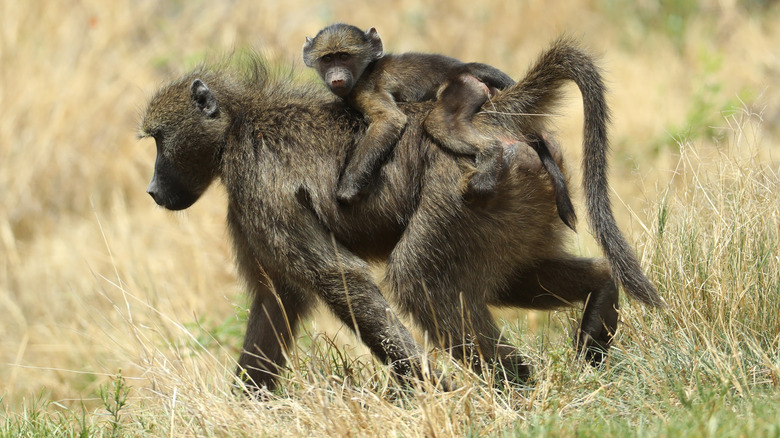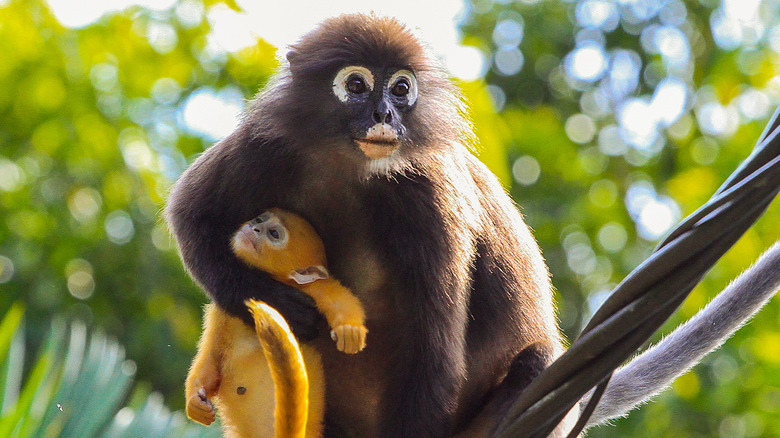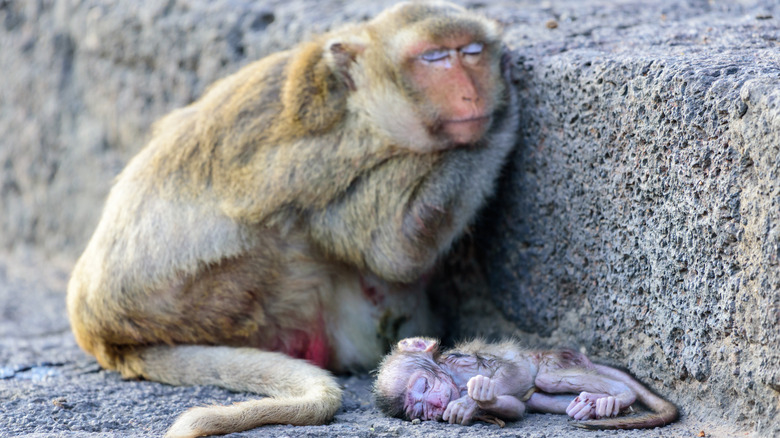Some Primates Hold Onto Their Dead Infants For A Heartbreaking Reason
It's been said over and over again by a myriad of generations that the only certainty in life is death. The coming and going of said generations is a testimony to that fact, and no matter how hard we try to cling to the fleeting curtain of life as it starts to close on us, the show must always end for everyone at some point. Some beings on this planet are better at grasping the truth than others, but we as humans seem to be among those that have an especially hard time accepting that we are one day going to die. In 2017, Chapman University carried out a survey that explored the various fears people experience on a day-to-day basis, and in that survey, 20.3% of Americans admitted to being afraid of death in some capacity or another (via Very Well Mind).
It stands to reason then that our closest genetic relatives would — to a certain degree — exhibit the same resistance to death. According to Live Science, several species of primates and monkeys have been known to display what you might consider disturbing behavior when death pays them a visit, but the truth behind it all is more heartbreaking than you'd expect.
Certain primates carry their dead infants around
"Non-human primates respond to the death of a conspecific in diverse ways, some of which may present phylogenetic continuity with human thanatological responses. Of these responses, infant corpse carrying by mothers (ICC) is the most frequently reported," a study by The Royal Society reported in 2021. Researchers have observed the phenomenon in various environments, both controlled and natural, and determined that up to 50 different species of primates are liable to engage in this puzzling behavior. Lemurs, apes, baboons, and macaques are among those that do, as Live Science reports.
It isn't uncommon for a mother to keep her dead infant nearby for a series of weeks, but timeframes vary. In 2003, a chimpanzee attended to her two deceased babies for a stretch of months. Otherwise, the average time that a mother will keep the child with her posthumously hovers around 10 days. They'll even continue to groom them and maintain their corpses as if they were still alive. It's a baffling and heart-wrenching behavior that has puzzled scientists and primate experts for decades, but the animals' reason for doing so is actually something that we as human beings can probably relate to in our own way (per Live Science).
Unable to grasp the truth
Essentially, it's a grief response. Mother primates who carry their dead infants around do so because they're not ready to say goodbye. "It is known that the mother-infant bond is regulated by emotions in primates — for example, mother separation from live infants causes anxiety in the mother," researcher Elisa Fernández-Fueyo told Live Science. "Carrying the corpse may be a way of coping with the stress related with the loss." In a sense, it's almost like a reverse Harlow phenomenon, in which baby primates were observed to cling to a mock-mother (a wire apparatus covered in fur) rather than feed themselves (via Psychological Science).
According to Psychology Today, there are certain factors that play into a mother primate's capacity to accept the death of their infant and act accordingly. If the baby died of illness or some form of gradual decay, it may not be apparent that they are in fact dead, so the mother will continue to nurse, groom, and care for it long into the decomposition process. Otherwise, if the infant died via trauma, fatal accident, or infanticide, mothers are less likely to carry it around. It was also determined that younger primate mothers are more prone to this behavior than older ones.


